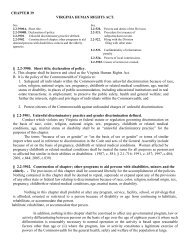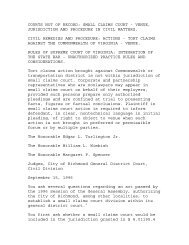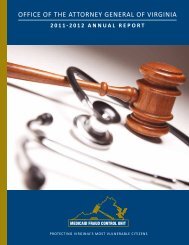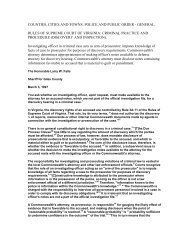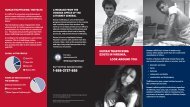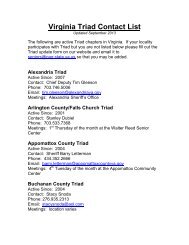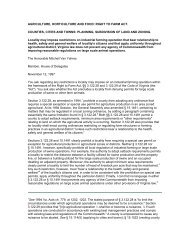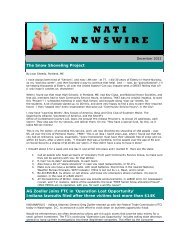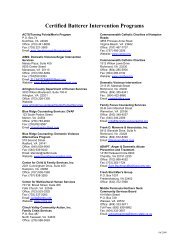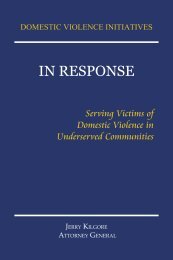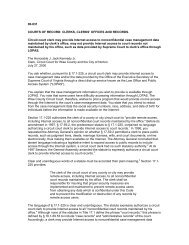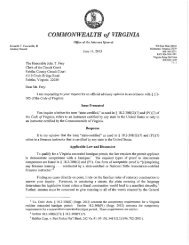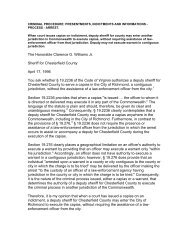2011 Annual Report - Virginia Attorney General
2011 Annual Report - Virginia Attorney General
2011 Annual Report - Virginia Attorney General
You also want an ePaper? Increase the reach of your titles
YUMPU automatically turns print PDFs into web optimized ePapers that Google loves.
xxvi<br />
<strong>2011</strong> REPORT OF THE ATTORNEY GENERAL<br />
Pharmacy, Veterinary Medicine, Dentistry, Funeral Directors and Embalmers,<br />
Counseling, Long-Term Care Administrators, Social Work, Psychology, Physical<br />
Therapy, Optometry, and Audiology & Speech-Language Pathology. In addition to<br />
prosecuting administrative actions against the licensees, HPU provides training to<br />
investigators, Board staff, and Board members. Many of the cases that HPU<br />
prosecutes involve standard of care violations, substance abuse, mental<br />
illness/incompetence, sexual touching, and patient abuse. Following formal hearings<br />
before the Boards, disciplinary sanctions, including suspension and revocation of<br />
licenses, are often imposed.<br />
HPU handled several significant cases before the health regulatory boards in<br />
<strong>2011</strong>. In May, following a formal hearing in Board of Psychology v. Rodriguez, the<br />
Board ordered Mr. Rodriguez’s license to practice as a psychologist in the<br />
Commonwealth be indefinitely suspended for not less than eighteen months. The<br />
Commonwealth's evidence showed that Mr. Rodriguez had committed a boundary<br />
violation by sexually touching a nineteen-year old client who had been referred by her<br />
insurance company for neuro-psychological testing. In addition, the Commonwealth’s<br />
evidence showed that Mr. Rodriguez had entered an Alford guilty plea to<br />
misdemeanor sexual battery in March <strong>2011</strong>.<br />
The Fair Housing staff prosecutes alleged violations of the <strong>Virginia</strong> Fair Housing<br />
Law. The prosecutions are based on “reasonable cause” findings and the resulting<br />
“Charges of Discrimination” issued by the <strong>Virginia</strong> Real Estate Board and the Fair<br />
Housing Board. In addition, the Unit serves as counsel to the Real Estate Board for<br />
fair housing allegations brought against real estate licensees and/or their employees or<br />
agents and to the Fair Housing Board for allegations against non-licensees. One of<br />
the more significant fair housing cases was Fair Housing Board v. Briarwood Hearth<br />
Owners’ Association, Inc. This civil action was filed in Chesterfield County Circuit<br />
Court after the Board determined there was reasonable cause to believe that the<br />
Association refused to make a reasonable accommodation regarding its parking policy<br />
for resident Patricia Walsh. Ms. Walsh suffers from a mobility impairment and<br />
requested reserved parking close to her residence. Despite receiving a copy of Ms.<br />
Walsh’s disabled parking placard as support, the Association refused Ms. Walsh’s<br />
request. The case settled after the parties engaged in discovery, with Ms. Walsh<br />
receiving $10,000 in compensatory damages. Additional relief included the<br />
Association reserving a disabled parking space for Ms. Walsh, the Association’s<br />
board members obtaining three hours of fair housing training annually for a period of<br />
three years, and the Association adopting a policy that ensures disabled residents will<br />
have an equal opportunity to use and enjoy their dwellings and the common areas at<br />
Briarwood Hearth.<br />
The Financial Crime Intelligence Center<br />
The Mission of the Financial Crime Intelligence Center (FCIC) is to identify,<br />
target, and disrupt the financial aspects of crime in the Commonwealth. The FCIC<br />
accomplishes this by identifying, targeting, and disrupting the flow of criminal<br />
proceeds. The FCIC enables Commonwealth’s <strong>Attorney</strong>s and other law-enforcement<br />
officials to better address and attack the financial aspects of crime in their area by<br />
identifying targets for investigations; providing “on-site” financial investigative



